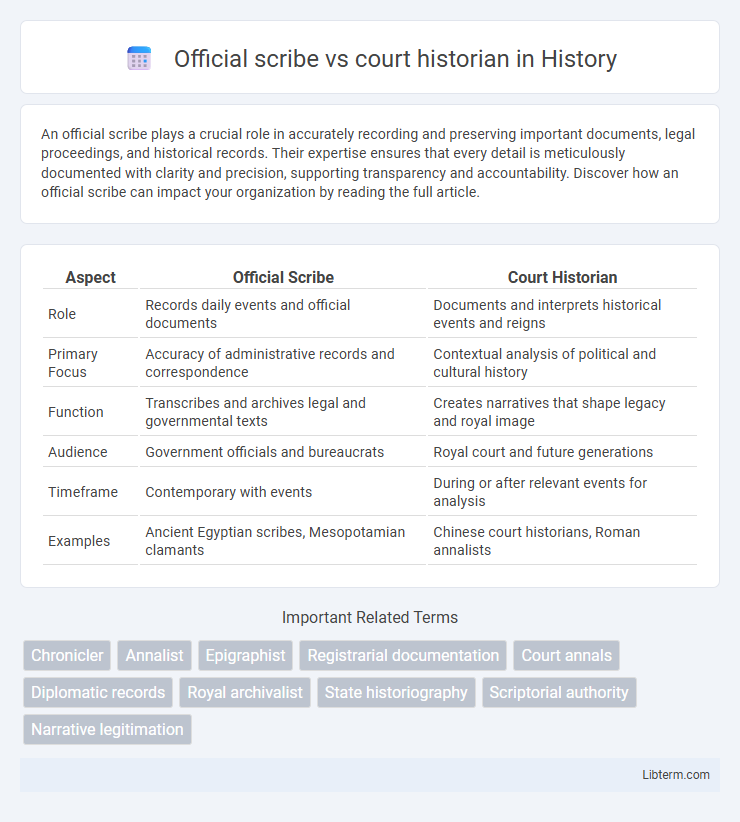An official scribe plays a crucial role in accurately recording and preserving important documents, legal proceedings, and historical records. Their expertise ensures that every detail is meticulously documented with clarity and precision, supporting transparency and accountability. Discover how an official scribe can impact your organization by reading the full article.
Table of Comparison
| Aspect | Official Scribe | Court Historian |
|---|---|---|
| Role | Records daily events and official documents | Documents and interprets historical events and reigns |
| Primary Focus | Accuracy of administrative records and correspondence | Contextual analysis of political and cultural history |
| Function | Transcribes and archives legal and governmental texts | Creates narratives that shape legacy and royal image |
| Audience | Government officials and bureaucrats | Royal court and future generations |
| Timeframe | Contemporary with events | During or after relevant events for analysis |
| Examples | Ancient Egyptian scribes, Mesopotamian clamants | Chinese court historians, Roman annalists |
Introduction to Official Scribes and Court Historians
Official scribes served as essential record keepers in ancient administrations, meticulously documenting decrees, legal transactions, and royal correspondence to ensure accurate archival records. Court historians held the responsibility of chronicling the reign, achievements, and significant events related to monarchs and state affairs, often shaping the historical narrative and legitimizing ruling power. Both roles were vital in preserving institutional memory, with scribes focusing on administrative precision and historians on contextualizing historical developments.
Defining Roles: Scribe vs. Historian
Official scribes primarily focus on accurately recording legal documents, decrees, and court proceedings, ensuring precise transcription for administrative and judicial purposes. Court historians specialize in interpreting and chronicling historical events, often emphasizing the significance and context of rulers' reigns and battles to shape collective memory. These distinct roles highlight the scribe's emphasis on exactness and documentation compared to the historian's broader narrative and analytical approach to historical legacy.
Historical Origins and Evolution
The official scribe originated in ancient Mesopotamia, where they served as administrative recorders and legal documenters, essential for early state bureaucracy. Court historians emerged during classical antiquity, particularly in Greece and Rome, tasked with chronicling the reigns and deeds of rulers, shaping royal propaganda and public memory. Over time, official scribes transitioned into broader civil service roles, while court historians evolved into more analytical chroniclers, influencing the development of historiography.
Responsibilities and Daily Duties
Official scribes primarily focus on transcribing legal documents, recording court proceedings accurately, and managing official records, ensuring all information is documented with precision and confidentiality. Court historians are responsible for researching historical events, compiling detailed narratives, and preserving the legacy and context of the ruling authority through chronicles and interpretive writings. While scribes emphasize real-time documentation and legal accuracy, court historians dedicate their efforts to analyzing past events and providing context to legal and political developments.
Methods of Record-Keeping and Documentation
Official scribes employed meticulous handwriting techniques using ink and parchment to create formal, legal documents and decrees, ensuring accuracy and permanence in record-keeping. Court historians preferred a narrative approach, compiling chronicles and detailed accounts through firsthand observation and oral testimonies, which were later transcribed and preserved in manuscripts. Both roles relied on systematic documentation practices, but scribes emphasized precise transcription, while historians focused on contextual storytelling to document historical events.
Sources and Information Access
Official scribes had direct access to primary documents, legal decrees, and administrative records, enabling them to record events with factual accuracy and official endorsement. Court historians relied on a broader spectrum of sources, including oral testimonies, previous chronicles, and cultural narratives, offering a more interpretative and sometimes subjective perspective. The scribe's information was often limited to immediate, sanctioned content, whereas the historian synthesized diverse materials to create comprehensive historical accounts.
Influence on Historical Narratives
Official scribes directly shaped historical narratives by recording events with institutional authority, often aligning accounts to serve ruling powers and legitimize authority. Court historians influenced historical interpretation by selectively emphasizing achievements, cultural values, and political ideologies favored by the monarchy or state. Both roles impacted collective memory, but court historians wielded greater influence on the broader cultural and ideological framing of history.
Objectivity vs. Official Bias
Official scribes are tasked with recording events and proceedings accurately, maintaining a high degree of objectivity to ensure factual documentation for legal purposes. Court historians, however, often face pressures to portray rulers and events in a favorable light, leading to potential official bias in their narratives. This distinction impacts the reliability of historical records, where scribes prioritize impartiality and historians may emphasize propaganda or glorification.
Legacy and Impact on Modern Historiography
Official scribes preserved primary records with high accuracy, ensuring the continuity of historical documents crucial for later scholarship. Court historians shaped narratives by interpreting events through political and cultural lenses, influencing historiographical traditions and national identity formation. Their combined legacies underpin modern historiography by blending factual documentation with analytical storytelling, fostering a comprehensive understanding of the past.
Conclusion: Choosing Between Scribe and Historian
Choosing between an official scribe and a court historian depends on the purpose and scope of record-keeping. Official scribes provide precise, contemporaneous documentation essential for legal and administrative accuracy, while court historians offer contextual narratives that preserve cultural and political heritage. Organizations prioritizing factual legal records benefit from scribes, whereas those valuing interpretative historical accounts lean towards court historians.
Official scribe Infographic

 libterm.com
libterm.com